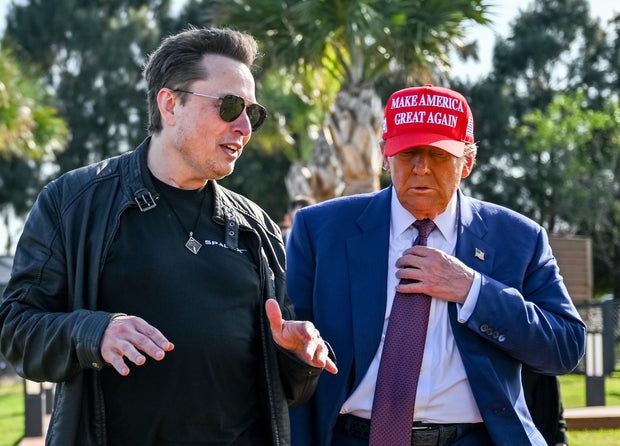President-elect Donald Trump delivered a likely death blow to bipartisan congressional budget negotiations, rejecting the measure as full of giveaways to Democrats after billionaire ally Elon Musk whipped up outrage toward the bill and cheered on Republican lawmakers who announced their opposition.
Trump’s joint statement Wednesday with Vice President-elect JD Vance stopped the bill in its tracks and punctuated a torrent of social media posts by Musk attacking the legislation for what he described as excessive spending.
“Stop the steal of your tax dollars!” Musk wrote on his social media platform X as he dangled primary challenges against anyone who voted for the budget deal, a threat Trump later echoed in a post of his own.
The episode showcased the growing political influence of Musk, a huge campaign donor and promoter of Trump-friendly messaging on X, the social media platform formerly known as Twitter that he bought in 2022. Trump has selected Musk alongside entrepreneur Vivek Ramaswamy to spearhead the Department of Government Efficiency, a nongovernmental task force formed to find ways to fire federal workers, cut programs and reduce regulations.
Rep. Andy Barr, a Republican from Kentucky, said his office was flooded with calls from constituents.
“My phone was ringing off the hook,” he said. “The people who elected us are listening to Elon Musk.”
Brandon Bell/Getty Images
In addition to keeping the government funded through March, the legislation included $110.4 billion in disaster aid, including $29 billion for FEMA’s disaster relief fund, which has been depleted in the aftermath of hurricanes Milton and Helene. The 1,500-page bill also included funding to rebuild Baltimore’s collapsed Key Bridge, a variety of health care provisions, and a congressional pay raise.
In his statement with Vance, Trump said Republicans should restart negotiations over the legislation, arguing that “anything else is a betrayal of our country.” He also called for including an extension of the debt ceiling while President Biden is in office.
“Increasing the debt ceiling is not great but we’d rather do it on Biden’s watch,” they said. “If Democrats won’t cooperate on a debt ceiling increase now, what makes anyone think they would do it in June during our administration? Let’s have this debate over the debt ceiling now.”
Then, in an interview with CBS News on Thursday, Trump said he thinks “the debt ceiling should be thrown out entirely.”
Trump’s opposition to what was considered must-pass legislation reinjected a sense of uncertainty and political brinkmanship that was reminiscent of his first term in office. It was a dramatic turn of events for House Speaker Mike Johnson, who negotiated the bill and has been undermined by Trump as he faces reelection for his post in just a couple of weeks. Republicans have a slim majority, raising the possibility of a replay of leadership disputes that paralyzed the House a year ago.
Many lawmakers were in the middle of holiday and year-end celebrations with staff when Trump came out against the legislation.
“I’ve been here 14 years, OK? So nothing up here surprises me anymore,” said Rep. Steve Womack, a senior Republican appropriator from Arkansas. “We shouldn’t be in this mess.”
The Biden administration criticized the possibility of a shutdown.
“Republicans need to stop playing politics with this bipartisan agreement or they will hurt hardworking Americans and create instability across the country,” said White House press secretary Karine Jean-Pierre.
Grover Norquist, president of Americans for Tax Reform and a veteran of Washington’s budget battles, was concerned about the lack of a clear plan for resolving the dispute.
“There’s got to be a second part of the strategy,” he said.
Norquist has been enthusiastic about Musk’s ability to generate public attention for efforts to reduce the size of government. But he suggested that the owner of a space rocket company wasn’t the right person to spearhead a congressional spending debate.
He doesn’t know politics like he knows physics,” he said.
But others were thrilled with Musk’s involvement.
“In five years in Congress, I’ve been awaiting a fundamental change in the dynamic,” posted Rep. Dan Bishop, a Republican from North Carolina. “It has arrived.”
Musk began criticizing the measure as soon as it was released Tuesday evening, and he continuously posted about it Wednesday.
“Any member of the House or Senate who votes for this outrageous spending bill deserves to be voted out in 2 years!” he wrote. He also called it “one of the worst bills ever written.”
Sometimes Musk amplified false claims, such as the idea that the legislation included $3 billion for a new football stadium in Washington. In reality, the legislation would transfer ownership of the land from the federal government to the city, paving the way for eventual development.
That followed a pattern seen in CBS News analysis of his posts during the campaign season, when Musk frequently shared false narratives about the election and amplified extreme voices from the right-wing fringe to his millions of followers.
Musk appeared emboldened by the experience combatting the funding bill.
“The voice of the people was heard,” Musk wrote. “This was a good day for America.”
Democratic House leader Hakeem Jeffries said the fallout would be Republicans’ fault.
“You break the bipartisan agreement, you own the consequences that follow,” he wrote on X.
Robert Costa
contributed to this report.


